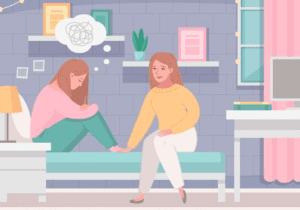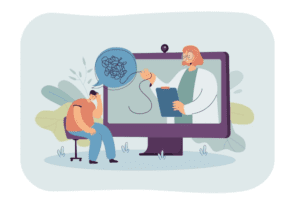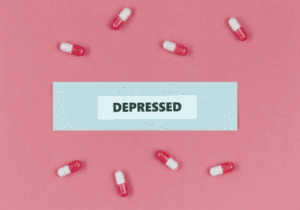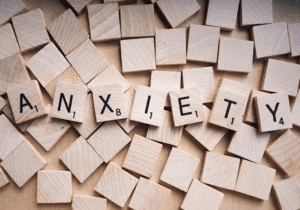Panic, Stress, and Anxiety Facing the Giant Praying Mantis
This article has been researched and written by Yassine Tayie. AI has not been used in producing this article.
We often throw around words like panic, stress, and anxiety as if they were the same. They’re not. Each taps into a very different part of how we react to life.
To make this more vivid, let’s borrow a symbol from the natural world: the praying mantis. You might know this insect for its graceful, prayer-like posture – but there’s a darker side too. In some species, the female praying mantis devours the male during or after mating. Desire and danger, attraction and death – all tangled together.
Let’s dive in.
A perfect creature to help us explore what happens when our emotions take over.
Panic: When Your Body Takes Over
Panic hits when you’re faced with an overwhelming external situation – something you weren’t ready for, couldn’t predict, and don’t have the codes to handle. It’s what happens in the heart of a traumatic event: an earthquake, a car accident, sudden violence. Example: You walk into a room, wearing your male praying mantis mask. A giant female mantis – three meters tall – appears, moving sharply, making unsettling sounds. Every signal in your body screams danger. That’s panic. There’s no time to think. You don’t wonder who you are. You don’t wonder how she sees you. Your body takes over: it will either freeze, flee, or fight. A pure, instinctive response to something too overwhelming, too fast.

Stress: When You Know What You’re Up Against
Stress is different. It’s a response to a pressure you can see, name, and prepare for. It mobilises you for action. Example: You walk into the room, still wearing your male mantis mask. You spot a female mantis. You know enough about mantises to know the risk – but you also know what to do. Stay alert. Move carefully. Plan your escape. You’re stressed – but you’re moving. Stress sharpens you – up to a point. The goal is to get just enough stress to fuel action – not so much that it paralyzes you, like too much coffee tipping into insomnia.
Anxiety: When the Danger Is Inside You
Anxiety is trickier. It doesn’t arise from a clear external threat. It comes from the inside – from uncertainty about yourself, your position, your meaning. Example: You walk into the room, mask on. Across from you stands the giant mantis – but this time, she’s not moving. She just stares.
You can’t tell if she’s male or female. You don’t see any clear signs of danger – yet you know enough about mantises to know it could still cost you your life.
And then it hits you: You don’t even know what mask you’re wearing.
You don’t know how the mantis sees you:
- Prey?
- Mate?
- Peer?
You’re not panicking – there’s no sudden move – but you’re caught. Caught trying to read the mantis’ intention. Caught wondering what you are in her eyes. That’s anxiety. Anxiety grows not because of what the Other does, but because you’re trapped trying to guess your own position – stuck between possibilities, with no clear answer. The more you stare at the mantis, hoping for a sign, the more anxiety tightens its grip.
The Way Out
The solution isn’t to wait for the giant mantis to make the first move – to give you a response. It’s to turn inward. To ask yourself: “Before I walked into this room, what mask was I wearing?”
Reconnecting with who you are – before the gaze of the Other froze you – is what helps anxiety loosen its hold.

Final Thought
Panic pulls you into survival. Stress pushes you into action. Anxiety freezes you in uncertainty — unless you turn inward, back to who you are. Because sometimes, the real danger isn’t what stands before us. It’s forgetting ourselves under the gaze of the world.
Tips for Communicating With Someone Who is Depressed
Knowing what to say to someone who is struggling with depression can be challenging. Perhaps you are afraid you might say the wrong thing. Or maybe you will say something that makes their day even worse? Maybe you fee…
Who Can Benefit From Couple Counseling?
Relationships are far from perfect. Each person brings his or her own ideas, values, opinions, and personal history into a relationship, and they don’t always match their partner’s. Those differences don’t necessaril…
What is EMDR Therapy and How Does it Help People?
Since the days of Freud, we’ve come to expect that managing our trauma is a lifelong journey. However, this is not the case. Eye Movement Desensitization and Reprocessing therapy (EMDR therapy) was developed in 1990 …
Everything You Need to Know About Couples Therapy
It’s perfectly expected for couples in relationships to face challenges from time to time. Every relationship has its unique needs and challenges. Couples see therapy for a number of unique reasons. From miscommunicat…
Does Social Media Cause Depression?
According to recent estimates, roughly 4 billion people worldwide use various social media platforms, including Facebook, Twitter, Instagram, and LinkedIn. It’s not hard to believe. When you take a look around a crowd…
Child Development: Play Therapy in Dubai
Every child deserves to feel safe, empowered, understood, connected, and loved. Play therapy is based on the foundation of providing a safe environment for children to process their emotions and develop the social, em…
The Future of Depression Treatment
According to the World Health Organization (WHO), depression impacts more than 264 million people globally. Once diagnosed, depression treatment can be by medications, psychotherapy, or a combination of the two. While…
How to Talk to Your Therapist When You Have Social Anxiety
Social anxiety disorder (SAD), also called a social phobia, is characterized by intense fear or anxiety of being negatively evaluated, judged, or rejected in a social situation. Individuals with social anxiety often …
Managing Depression During Social Isolation
The outbreak of the global coronavirus pandemic is stressful for many people. Since the World Health Organization (WHO) declared the COVID-19 outbreak a global pandemic, regions across the world have mandated quaran…
What are Cognitive Behavioral Therapists?
Cognitive behavioral therapy (CBT) is a common type of talk therapy (psychotherapy) that has been demonstrated effective for a range of mental health struggles including anxiety disorders, depression, substance abuse …











